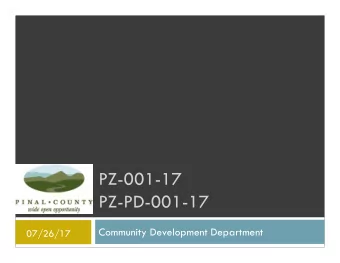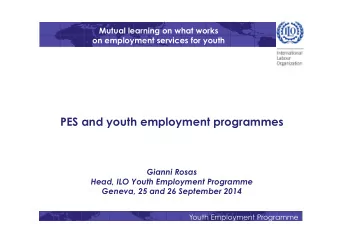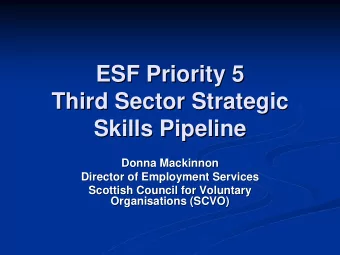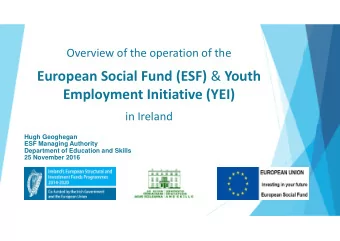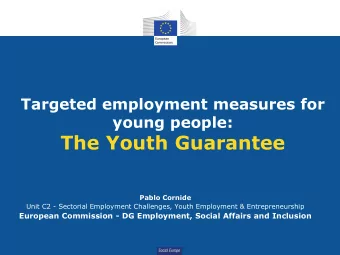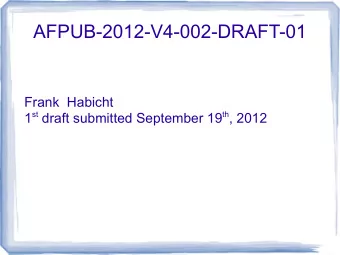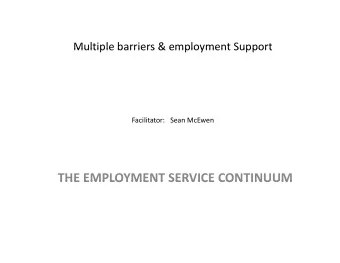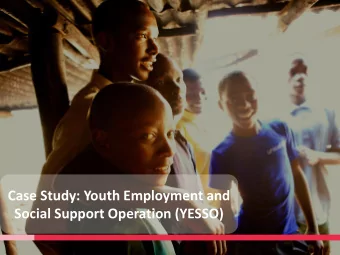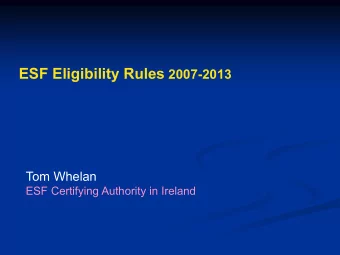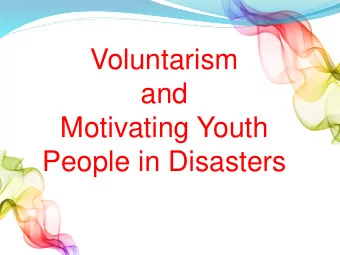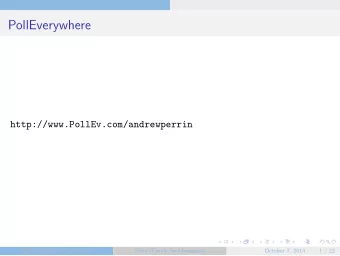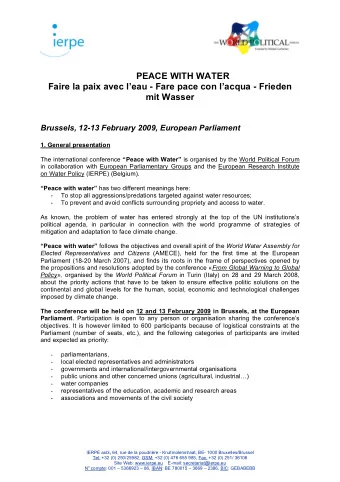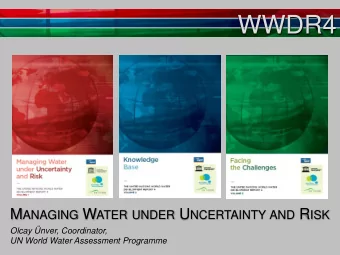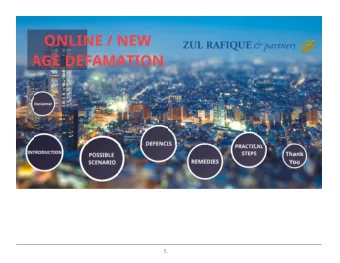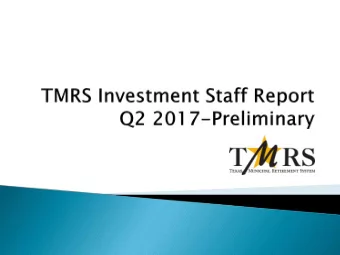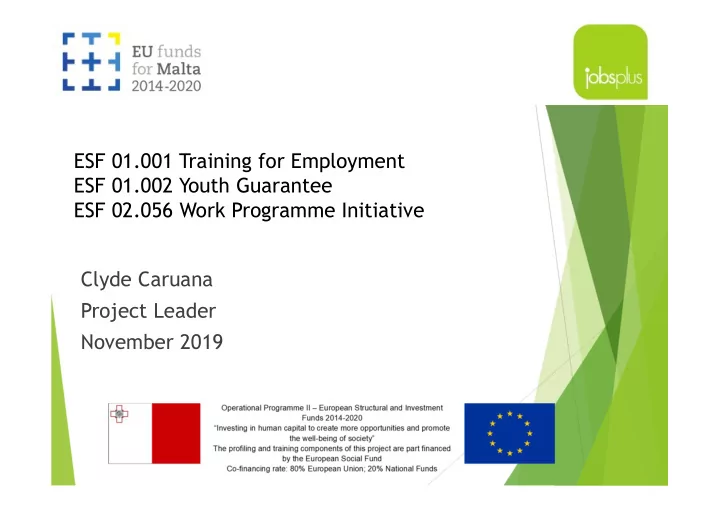
ESF 01.001 Training for Employment ESF 01.002 Youth Guarantee ESF - PowerPoint PPT Presentation
ESF 01.001 Training for Employment ESF 01.002 Youth Guarantee ESF 02.056 Work Programme Initiative Clyde Caruana Project Leader November 2019 Address the unemployed/inactive through active labour market policies which include both a work
ESF 01.001 Training for Employment ESF 01.002 Youth Guarantee ESF 02.056 Work Programme Initiative Clyde Caruana Project Leader November 2019
Address the unemployed/inactive through active labour market policies which include both a work placement and related training. This Project aims to facilitate the access to developing the knowledge, skills and competences of the working age population. The scope behind it is to offer training assistance to jobseekers needing to improve their skills to enter the labour market, find alternative employment and/or acquire new skills to meet the labour market demands.
Individuals supported (unique) Scheme Supported in 2019 (as at Total supported from end September) Jan 2016 till Sept 2019 Work Exposure Scheme 441 1,109 Traineeship 57 550 Work Placement Scheme 15 130 Total 513 1,789 As of April 2019, the Work Exposure and the Traineeship Schemes have been re-designed to be made more flexible for participants. Total number of No. of approved Scheme approved applications applications in 2019 (as from March 2017 till at end September) Sept 2019 Developing Skills Scheme 351 647
Occupational Handbook Aims to provide relevant information to describe how the labour market will look like in the future. It is a source of information related to 246 occupations found in the Maltese labour market which cover more than 90% of employees. The Occupational Handbook provides information on the following variables: i) number of employees, ii) employment growth, iii) employment forecast, and iv) median wages. The book also provides information about the skills required to access the relevant job.
PROJECT RESULTS SUMMARY Total supported Scheme MQF 1 MQF 2-3 MQF 4-5 MQF 6 from Jan 2016 till Sept 2019 Work Exposure Scheme 4 630 331 144 1,109 Traineeship 4 358 138 50 550 Work Placement - 81 48 1 130 Scheme Total 8 1,069 517 195 1,789 The overall retention rate of employment for the above schemes after 6 months stands at 56.5%.
Situation now in comparison to start of implementation
Key achievements YG: main achievements Partnerships - Set up of consultative committee to review efficacy or schemes - Partnered up with secondary school guidance teams - Formal agreement with Vocational Institutions - This made it possible to have better outreach and knowledge about the schemes that are on offer to those who are at risk of becoming NEETs. Outreach - Youth : letters, door-to-door, social media - Guidance / Educators: creation of database, targeted newsletters and information meetings - Employers: newsletters, FAQ’s booklet, Employers’ relations unit - Digitisation of all application forms
Key achievements cont. YG: main achievements Activation - Initiatives that build potential through holistic support - Lowering eligibility age from 16 to 15 years (to target school leavers). - Increased guidance and psychosocial support - Support offered over and above scheme timeframes - Upskilling course for professionals working with youth (26 professionals have been trained) Regular & Systematic monitoring across all YG Quality initiatives: - Monitoring visits (Announced & unannounced) - In-depth evaluations and survey - Standard Monitoring Operating Procedures
Major policy developments in last two years Introduction of consultative committee / increased psychosocial support / increased outreach campaigns /widening eligibility criteria / adjustment of initiatives based on response to surveys and questionnaires Future policy initiatives and status Introduction of better market-driven training modules / exploring better outreach solutions / Impact evaluation of initiatives (Q2 2020)
Work Programme Initiative The WPI draws a lot of resemblance to a similar scheme in the UK. The idea is to have the private sector help the PES deal with its workload and offer better work offers to registrants. Objectives: To up-skill long term unemployed jobseekers To place them in the labour market To help them retain their employment
Phase I: Profiling Assessment The Service Provider was requested to carry out an in-depth assessment of the participant on a one-to-one basis; This assessment helped determine skills, experience, motivation and training needs of participants Phase II: Training The Service Provider coordinated the necessary training for the Participants, after which the job seekers were then expected to be placed in employment. Mandatory courses: Work Ethics and Employability Skills Applied Basic English Applied Basic Maltese Applied Basic Numeracy Participants were to follow at least one of the mandatory courses above and other optional courses, if necessary.
Project Summary of Results Profiling Training Work Placement 1,613 1,088 279 In all 2,884 individuals to participate in the WPI. Out of these, 507 individuals started employed as soon as they were notified of the initiative or received the letter to attend the profiling. LTU duration of those who started employment Per cent Less than 3 years 12.6 3 - 5 years 31.1 6 - 10 years 26.2 More than 10 years 30.1 Total 100.0
The WPI four year programme came to an end in September 2019. Nevertheless, those placed in employment by the service providers will have to be followed for 36 months. Around 500 individuals who still remain long-term unemployed will be transferred again to Jobsplus. The caseloads will be handled by new employment advisors.
Recommend
More recommend
Explore More Topics
Stay informed with curated content and fresh updates.
